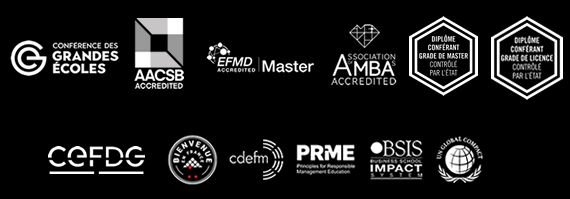Grandes Écoles (French: “great schools”) is not only the name of a Parisian hotel located in the historical, intellectual Latin Quarter, but it’s also a real institution of higher education in France, known for its highly selective admissions, prestigious and rewarding degrees, and academic excellence.
In addition to these criteria, there is an authentic French tradition of the “grandes écoles”, which are more highly regarded than average universities. While universities are considered mainstream institutions, grandes écoles are considered elite institutes (representing less than 5% of the student population) which guarantee success in life and feed the top French civil servants with a talent pool, advanced professional and technical training in several fields of study. About 250 grandes écoles are spread across France, and 230 are gathered within the Conference des Grandes Écoles, CGE.
To explain the machinery of higher education and to promote the “grande école” model, the French Conference of the Grandes Écoles widened the scope of its activities and communications with an English version of its teaching video about the concept of grande école and its implications for grandes écoles students’ careers and working lives.
What do Grandes Écoles specialize in?
All around France, “grandes écoles” offer excellent courses and award degrees up to BAC+8 level (eight years of study after graduating from high school). For more than 200 years, these private or public schools have been training students for multiple careers :
- Engineering
- Management
- Architecture
- Political science
- Journalism
- Art, design
- Defence
- Veterinary medicine
How does a student get admitted to a Grande École?
According to CGE’s statistics, there are multiple ways to be admitted into a “grande école”:
- 40% of students come from “classes préparatoires” (preparatory courses), two years of rigorous preparation
- 40% coming from Parallel Admission; after 2 or 3 years of study at university, outstanding university and international students can transfer to a Grande École without a competitive process
- 20% of students are high school graduates, and they get into a grande école directly after their baccalaureate exam, following a joint competition for students coming from classes specialized in topics related to the grandes écoles
Admission is a selective process. However, any motivated student can come to study in a grande école.
Is this worth how much it costs to be in a Grande École?
The cost per year varies depending on the type of Grande École and its specialities: public or private, Engineering, Business and Management, Sciences, and Humanities, among others.
Various support schemes are available, such as tuition waivers or scholarships. Students also have the opportunity to pursue an apprenticeship, which allows them to earn a salary while boosting their employability.

De Vinci Higher Education Career Fairs
The real-term value of a Grande École education has increased, as the global trend is for graduates to enjoy better job prospects and higher wages.
A degree from a grande école is truly a passport for employment, as well as a safe and profitable investment that guarantees excellent professional integration:
90% of graduates secure a job within less than 6 months, of which 80% on permanent contracts and full employment is achieved at 12 months
Businesses court graduates, whether they join micro, small, and medium enterprises or large groups. Often, they can choose the best career options that appeal to them.
National Recognition and International Accreditations: Key Indicators of EMLV’s Academic Excellence
In an increasingly competitive and globalized higher education landscape, business schools are continuously scrutinized through national and international quality labels.
While official French recognition, such as state approval, degree-granting authority, and membership in the Conférence des Grandes Écoles, provides a strong foundation, international accreditations add another dimension of distinction.
Granted by independent organizations, these accreditations are not mandatory, but they validate the school’s academic standards, teaching quality, and global outreach. Institutions like EMLV serve as key indicators of credibility, helping to attract international students and faculty, foster global partnerships, and ensure continuous improvement in governance and pedagogy.
EMLV Business School major national and international accreditations
EMLV Business School holds all major national and international accreditations, reflecting its commitment to academic excellence, internationalization, and professional relevance.
The school is accredited by AACSB, EFMD Accredited Master, and AMBA, placing it among the small percentage of business schools worldwide with this triple recognition. These accreditations ensure rigorous standards in teaching, strategic management, and societal impact.
At the national level, EMLV is authorized by the French Ministry of Higher Education to award degrees conferring the Grade de Master (Programme Grande École) and the Grade de Licence (Bachelor programmes), and is a member of the Conférence des Grandes Écoles (CGE).
Its programmes are evaluated by the Commission d’Évaluation des Formations et Diplômes de Gestion (CEFDG) and benefit from the Bienvenue en France label, underlining the quality of its international student services. EMLV is also a member of the CDEFM, UGEI, Campus France, and the UN Global Compact, and actively supports the Principles for Responsible Management Education (PRME).
Through its engagement in initiatives such as BSIS and PEPITE PON, EMLV further affirms its impact and dedication to entrepreneurship, innovation, and sustainable development.
EMLV is also a member of Concours SESAME, a competitive entrance examination for Grandes Écoles in Paris. EMLV recruits students through the Concours SESAME examination to select students who will join the school in the first year of the Grande École Programme.
Why being a member of CGE is important to EMLV and ESILV
Member schools of the CGE (Conference of the Grandes Écoles) share a common DNA:
- excellent education, which combines theory and practice along with numerous internships
- close connection to businesses and research
- great international exposure, thanks to academic mobility in internships abroad
- hosting of 20 to 30% of international students
- a rich, associative, cultural, and sports life on modern and attractive campuses
- a strong commitment to common values and challenges, such as solidarity, equity, and protecting the environment, shared by students and alumni networks
The Conference des Grandes Écoles certifies the quality of the courses and the excellence of all its member schools.
Are you interested in studying in a Grande École? Read more about our programmes here.






















